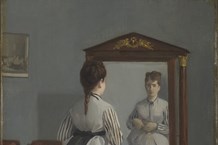John Williams and Susan Teesdale, of the Vale of Glamorgan Antiques Centre in Cowbridge, uncovered the stash of sketches, papers and personal effects after opening the secret drawer in a George III chest they bought at Bonhams, Bath on June 25.
It later transpired that the chest had once belonged to Sir Kyffin, who died last September aged 88.
Initially, they were delighted with their find - which included some red ink studies of daffodils, a sketch of a horse and the design of an anchor, as well as correspondence, newspaper clippings and buttons from his Royal Welsh Fusiliers jacket (see page 2 of ATG No 1806).
The discovery was widely publicised in the local press prior to sale at Colwyn Bay auctioneers Rogers Jones on September 22, where the cache was expected to make £1000-2000.
Everything looked straightforward until September 12, when the National Library in Aberystwyth filed an injunction preventing the sale from going ahead.
"The first we knew of it was when injunctions were served to me at my house that evening and at John's work premises," said Ms Teesdale. "We were both shocked."
The argument was over ownership: Sir Kyffin, who died last year, bequeathed his artworks and papers to the National Library of Wales, Aberystwyth, but left his furniture to the University of Wales at Bangor - who then sold on the surplus items at Bonhams.
The National Library's position was that the artworks and papers belonged to them under the terms of the bequest. The dealers believed that they had title, as they discovered the contents after purchase, despite the fact that the chest had passed through the hands of the executors, the university and the auctioneers.
They both categorically stated that, although they guessed that there might have been papers inside the secret drawer (this was its purpose, after all), they did not know what they were.
Milton Silverman, the ATG legal correspondent, said that in any individual case it was impossible from the outside to say who should have legal ownership, since this would partly be determined by the precise terms of the bequest, which would need scrutinising.
"On the one hand, it sounds as though the dealers have simply discovered in the drawer items belonging to someone else; but there may be some line of argument to hold the executors ultimately responsible, even though any mistake on their part may have been inadvertent."
The problem for the dealers was that the injunction forced them to choose quickly what course of action to take: to fight or not fight? If they had fought and won they would have had to seek to recover costs from the National Library; if they had lost they would have been bankrupted.
The only option seemed to be to cave in to the National Library's demands, which were issued with a deadline of 4pm last Friday (September 21), and take the few hundred pounds costs already incurred by legal advice as a learning process - and write off the potential profit from the planned sale.
Faced with the likelihood of soaring legal costs, they decided to give up on the whole thing.
"We were pushed into a corner that we couldn't get out of. It's been an interesting experience," said Ms Teesdale.
By Vivienne Lawes
Dealers give in to legal threat over Kyffin Williams find
THE dealers who found a cache of work by the artist Sir Kyffin Williams in a secret drawer have given it up in the face of legal pressure.




